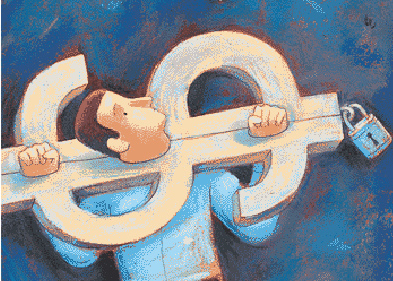Here’s How Refinancing a Car Loan Works if You Have Bad Credit

Are you stuck with a high interest rate on a car loan? If so, you might feel like the kid who wasn’t invited to the secret club that hung out after school. All your friends might brag about their 2.9% rate while you’re stuck with a number in the teens (or God forbid, the twenties), making you feel like don’t belong.
Poor credit puts you in a hamster’s wheel. You know how it goes – a low score means high interest, high interest brings more debt, and more debt tends to reduce your score even more. Ultimately, it brings you further away from the chance of refinancing a car loan.
In a world that takes advantage of or ignores those with bad credit, you might assume that no one cares about your situation. But there is hope. You can get in the not-so-exclusive club of low interest-paying members if you’re willing to turn your obstacles into an advantage.
In fact, with this post, we’re going to teach you how to do just that.
Get familiar with the yin and yang of interest rates & credit scores

The lead characters in those martial arts movies from the 70s and 80s often talked about yin and yang, and it’s a concept that applies to finance. The ancient Chinese philosophy of yin yang says opposite forces actually complement each other. It’s true with money too – your credit score and interest rate work together.
For example, winter and summer is example of yin and yang. They’re different seasons, but weather patterns such as El Nino and La Nina can cause them to affect each other. That’s why some years have months of extended heat or cold – a particular season may “dominate” that year.
Think of your credit as “yin”. If it is stronger, you create a positive chain reaction where banks and lenders give you better interest rates and easier approvals. More importantly, you’ll feel more responsible and sleep easier.
Now think of interest and debt as “yang”. If this force is stronger, you’re more than likely to have bad credit and the consequences are obvious. Getting approved for loans much less refinancing one, will feel like climbing a mountain and generally, you’ll deal with more stress and anxiety.
No one needs to tell you which one is better.
With that said, how many of you can say that your high school teacher explain how these forces worked? We’ll assume that almost all of you never had that education.
Well, here are some facts…
The lesson here is that every point, whether it’s one added or one subtracted, affects your interest rate to some degree. Of course, a slight dip in credit score won’t launch your interest rates into space, just as a minor hike in score won’t flatten your rates that much either. Just take a look at the chart below.

With that said, you need to take control over your destiny here. Going back to the idea of martial arts movies (and any movie for that matter), the villain or “evil” that plagues a character is almost always stronger. It takes determination to win. Generally, the character often has to exploit a weakness the villain has, and use that weakness against them.
Your quest to refinance a car loan with bad credit is a similar battle. The fight is challenging, but you can use your loan against itself so-to-speak.
How will an auto loan get you there?
Now how can the same thing that brings unbearable interest rates help you pay less in interest? The answer lies in credit types and credit history. As some of you may know, there are two types of credit – installment and revolving.
Revolving credit: With this type of credit, banks give you the maximum amount available for particular a loan, with no requirement to make fixed payments. Because of this, they’ll often slap on higher interest rates for these kinds of agreements. Common examples of revolving credit include in credit cards and lines of credit.
Installment: This kind of credit is structured with a fixed amount of payments (almost always monthly) a customer is obligated to pay. Lenders tend to see installment loans as less risky, charging lower interest rates (although bad credit can make this untrue). Mortgages, student loans and car loans are examples of installment credit.
Paying off any kind of credit early and in full will look good on record. But paying off installment credit – such as your auto loan – is a great way to improve your credit and it turn, get a chance to refinance your car loan.
Why? Well, a structured car loan gives you the opportunity to establish a good record that shows you make payments on time. The result of this is a gradual increase in your credit score, which the lenders like to see more than anything else.
But of course, if you don’t make regular payments on your auto loan, it will work against you. Your credit score will dip, lenders will look the other way, and refinancing a car loan will get even more difficult.
But how you do this amidst all your other debts?

Now to be honest, making regular payments on a car loan ain’t easy. You’re probably saying, “thanks Auto Loan Solutions, for telling me that I need to just pay an auto loan when I have the world left over as an expense!” It can definitely feel like trying to run up a hill with a heavy weight on your back.
But look at this way: you wouldn’t qualify for a loan if you’re not making enough money – a number that varies depending on the company. So here’s what you need to remember – prioritize! If you really need a car and qualify for one, then you can make it work.
Before applying, work out a monthly payment that doesn’t strain your income and that allows you to pay off your other debt. What you can afford compared to someone else may not be the same, and that shouldn’t matter – what matters is that the payment works for you.
The Balance has crafted a chart which you can use to budget (note: we only included a portion of it so it doesn’t overwhelm you, the rest is here).
| Expenses Worksheet | ||||
| Category | Monthly Budget Amount | Monthly Actual Amount | Difference | |
| Home | ||||
| Mortgage or Rent | ||||
| HOA Fees | ||||
| Homeowner’s or Rental Insurance | ||||
| Property Taxes | ||||
| Home Repairs/Home Maintenance | ||||
| Home Improvements | ||||
| Utilities | ||||
| Electricity | ||||
| Water/Sewer | ||||
| Natural Gas or Oil | ||||
| Telephone/Data Plan | ||||
| Cable TV/Internet | ||||
| Food | ||||
| Groceries | ||||
| Restaurants/Fast Food | ||||
| Coffee/Alcohol | ||||
| Family Obligations | ||||
| Child Support | ||||
| Alimony | ||||
| Daycare/Babysitting | ||||
| Activities/Lessons | ||||
| Health and Medical | ||||
| Health Insurance Premiums (if not deducted from paycheck above) | ||||
| Vision Insurance Premiums (if not deducted above) | ||||
| Dental Insurance Premiums (if not deducted above) | ||||
| Unreimbursed Medical Expenses/Insurance Co-Pays | ||||
| Prescription & OTC Medications | ||||
| Fitness (e.g., Personal Trainer, Gym, Yoga) | ||||
| Transportation | ||||
| Car Loan/Lease Payments | ||||
| Car Insurance | ||||
| Gasoline | ||||
| Car Repairs/Maintenance | ||||
| Public and Other Transportation (Bus, Subway, Taxi, Ride Share) | ||||
| Other Transportation Expenses (e.g., tolls, parking expenses) | ||||
| Debt Payments | ||||
| Credit Card Payment | ||||
| Student Loan Payment | ||||
| Other Loans | ||||
| Other Insurance | ||||
| Life Insurance Premiums | ||||
| Education | ||||
| Tuition | ||||
| Textbooks | ||||
| School Supplies | ||||
| Entertainment/Recreation | ||||
| Computer Expenses | ||||
| Subscriptions and Dues | ||||
| Hobbies | ||||
| Vacations/Travel | ||||
| Other Entertainment | ||||
| Pet Care | ||||
| Pet Food | ||||
| Grooming, Boarding, Veterinary | ||||
| Personal Care | ||||
| Toiletries/Cosmetics | ||||
| Household Products | ||||
| Clothing | ||||
| Other Personal Care | ||||
| Savings and Investments | ||||
| Retirement Accounts (not deducted from paycheck – e.g., IRAs) | ||||
| Brokerage Accounts | ||||
| College Fund | ||||
| Savings/Emergency Savings | ||||
| Miscellaneous | ||||
| Gifts/Donation | ||||
| Other Miscellaneous | ||||
| Total Expenses: |
Admittedly, this can be tricky because, our emotions tend to hack our brains much easier and much more than our logic does. If you’re not sure how to fit an auto loan payment into your budget, don’t be afraid to resort to various debt management techniques (such as the avalanche method or snowball method). In fact, an extra pair of eyes, perhaps from a financial advisor, can lift much of the stress that budgeting can bring. So don’t hesitate!
Keep your record clear clean
Although your auto loan affects your credit, it’s not the only factor. It’s just one part of the mosaic that is your credit score. Remember, all your other loans and lines of credit matter too, and that means you gotta pay them down too and eliminate these debts.
And what’s even more important, is to avoid the following:
Bankruptcies: The word alone can give you a sense of doom. As you may already know, filing bankruptcy is a last resort when you have no means of paying off your debt. Keep in mind though, that a bankruptcy drastically affects credit and remains on record for seven years.
Collections: Missed bill payments, in whatever form, whether they’re phone bills or credit balances, will get the collection agencies phoning you. It could happen 60 – 90 days after the due date. This goes on record, affects credit and leaves lenders thinking you’re unreliable with credit.
Repossessions: Another consequences of not paying certain bills is a repossession. It’s the unpleasant act of a company taking back an item that you have not paid for, due to missed payments such as a car. Again, a repo appears on record and is damaging to your credit.
These reports are scars on your record, requiring years before they disappear and in effect, damage your chances of refinancing your car or anything else for that matter. So the lesson here is clear: try your best to keep your record as clean as possible.
When does the magic happen?
Providing you’re on your A-game, it can happen in 12 months. Of course, it will take longer if you have “slip ups” along the way (ie. missing payments). So you want to do your best to make sure your record looks clean all across the board. That means no delinquencies (fancy word for bad reports).
You want to treat this credit rebuilding program like a diet and exercise program. Stay consistent, and you’ll see better results, faster.
Now You’re Ready
You can refinance when you’ve wrestled with your debt to the point that you now have it in a chokehold. That doesn’t mean you’ve completely defeated it, but it suggests that you have significant control over it so as to give a lender more confidence in taking further risks with you.
Now keep in mind that this isn’t always an “easy-as-abc” process, and you may reach a “crossroads” so-to-speak. Depending on the terms of your car loan and the car you drive, you may have to change your approach to refinancing. The choices you make will likely depend on two factors: the present state of your credit and the car you currently drive.
Present state of your credit
Take a look at your credit. If the score has improved and your report looks relatively spotless, then you can sleep peacefully knowing the option to refinance is around the corner.
Just remember though that your score may not jump from the Earth to the Moon overnight and your new interest rate might not fall from the peak to bottom right away. You’ve heard that clichè phrase, “Rome wasn’t built in a day” and building a great credit score is no different.
The Car You Currently Drive
The second indicator of whether you can refinance or not, is the car you’re driving at the moment. There are “deal breakers” that can make your vehicle unlikely to get consideration for refinancing. If that were to happen it’s nothing against you – they’re just rules put in place to make a refinancing deal worthwhile for both you and the lender. Let’s take a look at what they are.
- Age of vehicle – Dealers tend to skip over cars that are more than seven years old. Aged vehicles lose quite a lot of value over the years, making them unfit for refinancing in a lender’s eye.
- Size of the loan – A very small or very large loan amount can affect your chances of getting refinanced. This varies from lender to lender.
- Mileage on car – Don’t confuse this with the age of your car. After all, a 5 year old car could have 60,000 km on it, while an 8 year old car may only have 35,000 km on it. With that said, a car with very high mileage on it might will most likely not get refinanced.
The End Result
You obviously want your attempts to a refinance a car loan succeed. Of course, your success depends on how well you meet the criteria of your lender. Ideally, you will have been set up to meet these requirements from when you first got your loan.
Here at ALS, for example, we avoid selling beaters. The prehistoric rust buckets that could fall apart at any second because they’ve got a million klicks on them, wouldn’t help you in any sense.
Providing you have good credit and a car that’s in healthy condition (and not too old), there’s a great chance that you will qualify for refinancing.
I Want to Refinance My car
For people with good, great or excellent credit refinancing can be a good or bad idea. Refinancing can be good if a person bought a car when interest rates were higher than normal, or if they want a shorter loan term due to better finances. It can be bad, however, if a person want’s to refinance their loan just to extend it (as this could bring more debt), or if their are early-termination fees.
With bad credit however, refinancing is almost always a good idea because it means paying less interest and building less negative equity, with that said there’s a ripple effect that occurs since paying less interest means more money in your pocket to pay off debts, thus, creating that positive cycle you need to get out of the red.
Of course, that could mean finally give you room to put money in your savings account, emergency fund or an investment of some kind, in fact scratch all of that, it means you can finally go to bed without thoughts of debt lingering in mind.
Your Ticket In
Hopefully, this post has helped you to see a way out of the high interest trap. It’s not pleasant to stay here for long and it can be a necessary evil, but if you’re willing and able, you can turn things around.
You now see that refinancing a car loan with bad credit is a process that takes a change in thought, habit and perhaps even interests (excuse the pun). It can take a year or more depending on your situation. But if you feel like the weight is long, remember this quote from radio personality and author, Earl Nightingale, “Never give up on a dream just because of the time it will take. The time will pass anyway.”






